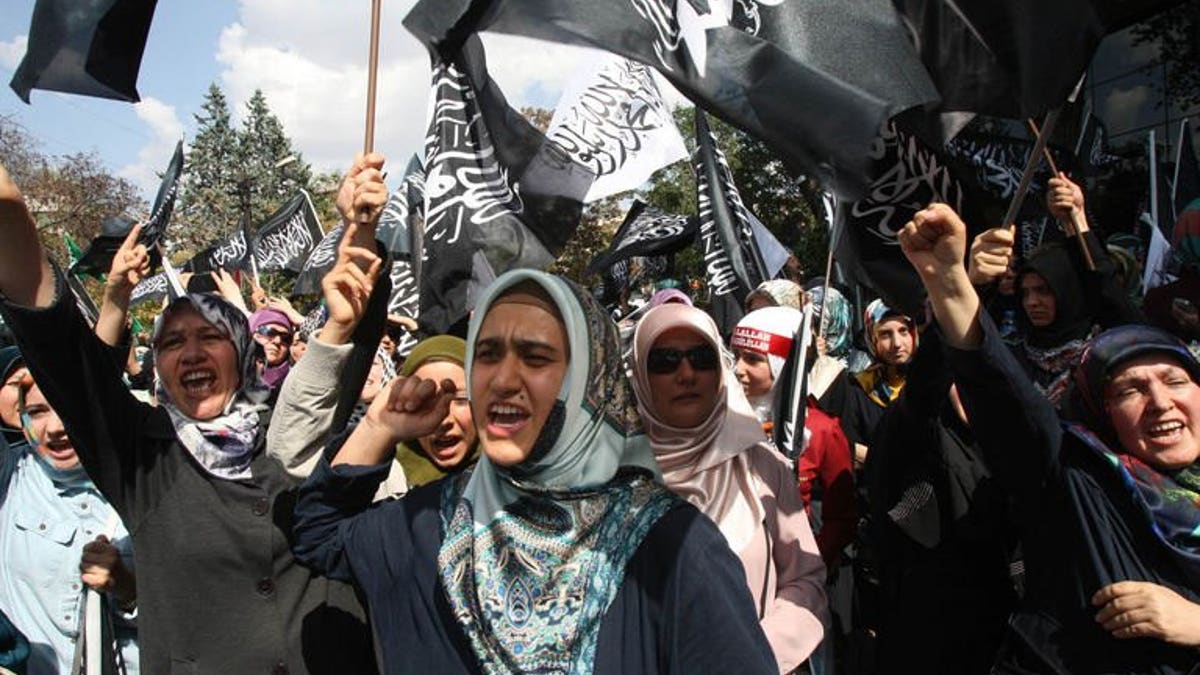
Supporters of Egypt's unseated Islamist president Mohamed Morsi demonstrate outside the US Embassy in Ankara on August 16, 2013. Egypt and Turkey on Friday cancelled planned naval exercises, the latest escalation in a diplomatic row over the bloody crackdown on ousted president Mohamed Morsi's supporters. (AFP)
ANKARA (AFP) – Egypt and Turkey on Friday cancelled planned naval exercises, the latest escalation in a diplomatic row over the bloody crackdown on ousted president Mohamed Morsi's supporters.
Both countries claimed to have made the decision the scrap the joint drills scheduled for October, with Cairo saying it had pulled out to protest Turkey's "clear interference" in Egypt's domestic affairs -- an accusation Ankara denied.
The move came after both countries announced Thursday they were recalling their respective ambassadors, following Turkish Prime Minister Recep Tayyip Erdogan's condemnation of what he called the "massacre" of peaceful protesters in Egypt.
Erdogan, a supporter of Morsi and his Muslim Brotherhood movement, had also infuriated the interim government in Cairo by calling Morsi's July ouster a "coup".
About 600 people were killed in the violence that erupted in Egypt on Wednesday when security forces broke up pro-Morsi protest camps, the worst unrest in the country since the 2011 uprising that unseated long-time ruler Hosni Mubarak.
Thousands of Turks on Friday protested the bloody crackdown, waving portraits of Morsi and chanting "Infidels are killing Muslims!"
The Egyptian foreign ministry said it had cancelled the planned naval exercises in "protest at the unacceptable Turkish statements and actions which represent a clear interference in Egypt's domestic affairs and stand against the will of the Egyptian people."
But Turkish foreign ministry spokesman Levent Gumrukcu said that NATO member Turkey had in fact been the one to scrap the drills.
"We have made the decision on the cancellation of the naval exercise planned to be conducted with Egypt," he wrote on Twitter.
"Today the decision on the cancellation of an invitation for both the exercise within NATO and the bilateral exercise has been conveyed to the Egyptian side."
Turkish President Abdullah Gul rejected the criticism that his country was interfering in the affairs of the Arab world's most populous nation, saying Turkey's messages should be seen as a "friendly warning".
"All that happened is a shame for the Islamic and Arab world," Gul was quoted as saying by the private Dogan News Agency during a visit to Azerbaijan.
"(Egypt's) friends feel the pain. I feel the pain for each and every Egyptian who was killed," he added.
In the Turkish capital, around 3,000 protesters performed a funeral prayer for the dead in Egypt at a mosque before marching to the US and Egyptian embassies.
Some of the young protesters had their faces painted in the horizonal red, white and black bands of the Egyptian flag.
In Istanbul, more than 1,000 protesters gathered in front of a mosque, shouting "Get lost, Sisi!", referring to Egyptian army chief Abdel Fattah al-Sisi.
Erdogan, who heads Turkey's Islamic-rooted ruling party, the Justice and Development Party (AKP), had forged a close alliance with Morsi since he was elected in Egypt's first free election in June 2012.
The Islamist leader was invited to the AKP's annual congress last September, where Erdogan sought to position Turkey as a regional standard-bearer and a model for the successful marriage of Islam and democracy.
Turkish leaders have hinted they will not cut ties with the new leadership in Egypt after Morsi's ouster, despite their criticism of the army for ousting him.
This week's unrest in Egypt is expected to hit around 260 Turkish businesses operating there.
Turkish investment in Egypt amounts to nearly $2 billion (1.5 billion euros), mostly in the textile and clothing industries, while over 4,000 Turks are registered as living there.
After arriving back in Turkey on Friday, the ambassador to Cairo, Huseyin Avni Botsali, said: "There is common will between the two countries so as not to harm trade relations... but everything depends on the situation of stability and security."




















